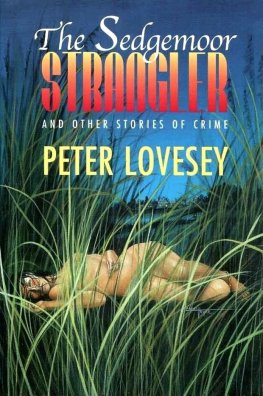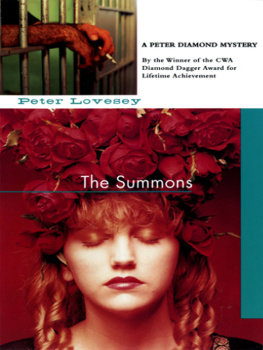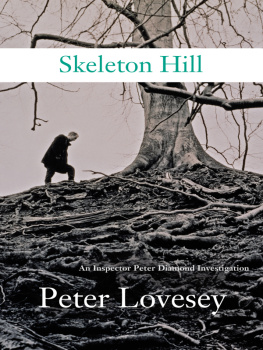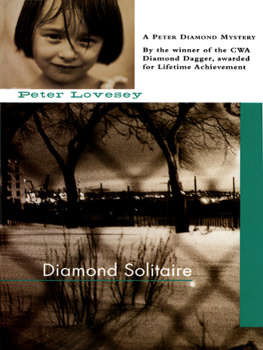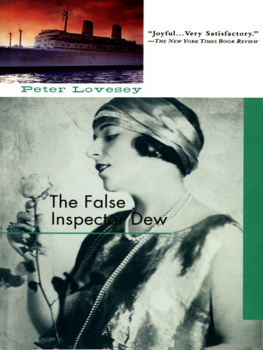Peter Lovesey - The Tick of Death
Here you can read online Peter Lovesey - The Tick of Death full text of the book (entire story) in english for free. Download pdf and epub, get meaning, cover and reviews about this ebook. genre: Detective and thriller. Description of the work, (preface) as well as reviews are available. Best literature library LitArk.com created for fans of good reading and offers a wide selection of genres:
Romance novel
Science fiction
Adventure
Detective
Science
History
Home and family
Prose
Art
Politics
Computer
Non-fiction
Religion
Business
Children
Humor
Choose a favorite category and find really read worthwhile books. Enjoy immersion in the world of imagination, feel the emotions of the characters or learn something new for yourself, make an fascinating discovery.

- Book:The Tick of Death
- Author:
- Genre:
- Rating:5 / 5
- Favourites:Add to favourites
- Your mark:
- 100
- 1
- 2
- 3
- 4
- 5
The Tick of Death: summary, description and annotation
We offer to read an annotation, description, summary or preface (depends on what the author of the book "The Tick of Death" wrote himself). If you haven't found the necessary information about the book — write in the comments, we will try to find it.
The Tick of Death — read online for free the complete book (whole text) full work
Below is the text of the book, divided by pages. System saving the place of the last page read, allows you to conveniently read the book "The Tick of Death" online for free, without having to search again every time where you left off. Put a bookmark, and you can go to the page where you finished reading at any time.
Font size:
Interval:
Bookmark:
Peter Lovesey
The Tick of Death
CHAPTER 1
The infernal machine lay in an underground room in the Danger Buildings of the Royal Arsenal. A sandbag structure round the inspection-bench kept observers an arms length away. Illumination was provided by gaslight reflected through glass.
The first time Ive ever set eyes upon one, said Detective-Sergeant Cribb, innocent of what was to come.
For all their destructive possibilities, the parts were pleasingly arranged in a metal cashbox. A cheap alarm clock from which the back had been removed. A pistol attached to it with copper wire, so that when the alarum was released, the revolving winder would be set in motion, and depress the trigger. Seven detonators ready in the box, their ends presented to the muzzle. Cakes of dynamite stacked around the side. The whole wrapped in cloth and wedged into a large leather portmanteau stuffed just as solidly with dynamite.
It would have made an appreciable alteration to Paddington station last February if the mechanism had worked, observed Colonel Martin, the Home Office Inspector of Explosives. A formidable crop of black whiskers covered three-quarters of his face, but his eyes were pale blue and had a wistful look.
The men from Scotland Yard visualized the scene of devastation in Mr Brunels great glass and iron structure.
Might I venture to inquire what prevented it from working? asked Detective-Inspector Jowett, after a decent interval.
Observe, commanded the Colonel, thrusting a wooden pointer in the direction of the bomb. His companions swayed back on their heels. Dyou see the brass plate on the back of the clock, under the gun? And dyou notice the pin at the corner? Well, gentlemen, the Great Western Railway owes the survival of its principal terminus to nothing of more consequence than that pin. It was fractionally dislodged when the bomb was put in place, and it projected far enough from the plate to check the deadly action of the alarum winder.
Fancy that! said Inspector Jowett, so dedicated to the cause of personal advancement that he was ready to fancy anything a senior officer showed him. Merely a pin, you say. By Jove, I detect the hand of Providence in this.
A pity Providence was unable to prevent the explosion at Victoria station the same night, said Colonel Martin acidly. Perhaps the directors of the London, Brighton and South Coast Railway should search their souls for an explanation. I tend to take a less spiritual view of things, Inspector. The working parts of an infernal machine are relatively simple to arrange, but their effectiveness depends on the proximity of a large and cumbersome mass of dynamite. When all this is encased in a portmanteau and conveyed in hazardous circumstances to the site selected for destruction, you may imagine that a delicate mechanism is liable to be displaced.
I can imagine it perfectly, thanks to your lucid explanation, said Inspector Jowett.
The Colonel gave him a long look. Well, that is what happened at Paddington on the night of February 25th. As you probably recall-
Not only that, Jowett broke in. Other bombs that had failed to detonate were found next day at two other stations. London Bridge and Ludgate Hill. I dont know what happened to them, but you might find it worth your while to examine them, Colonel.
Thank you. They are in the room behind you. Each of the alarums was set for one oclock, the time the explosion took place in the cloakroom at Victoria. Unless you have other information, of course?
Not at all. Simultaneous explosions. Ugly business. Theres an organisation behind this, Colonel, depend upon it.
The Colonel indicated with a slight narrowing of the eyes that the possibility had not escaped him.
A conspiracy, Jowett continued without check, steaming ahead on all boilers. No doubt about it. Dynamitards. Theyre here in London leaving bombs in station cloakrooms like bowler hats. Question is, Colonel, what have you discovered about em? You cant tell me this box of tricks hasnt furnished you with information. I know you chaps from the Home Office too well for that.
It was unfortunately clear that Inspector Jowett did not know Colonel Martin well enough to realise he was irritating him. I forwarded a full report to your Special Political Branch at Scotland Yard two months ago. I suggest that you ask them to allow you to read it.
Ah, now theres a complication, said Jowett, impervious to sarcasm. Your report might make good sense to me, but it is Sergeant Cribb here who will need to have the information, and without disrespect to anyone I would rather that he had it first-hand. Cribb does not know it yet, but he has a privileged status, Colonel. He is in a better position to provide Scotland Yard with information about the dynamite party than the whole of the Special Branch together. We are here on the highest authority.
Cribb listened in disbelief. The purpose of the visit was a mystery to him. Jowett had simply summoned him to the Yard, hustled him into a hansom and driven him to Woolwich. Even when they drove through the main gate he could think of no reason for being in the Arsenal.
Very well, then, said Colonel Martin. Ill address myself to you, Sergeant. What do you know about infernal machines?
Practically nothing, sir.
Hm. Better not stand so close then. No, just my joke, Sergeant, just my joke, though what the wisdom is of assigning a novice to defeat the dynamiters, I cannot begin to apprehend.
Nor me, sir.
At least we understand each other. Lets look at this contraption then, shall we? Colonel Martin stabbed at the bomb again with his pointer. Cheap alarm clock, of American manufacture. Revolting name-Peep oDay- wouldnt be countenanced here. Cartridge-firing pistol. Imitation Remington, but it bears no makers imprint. Combined cap and cartridge similar to a type made at Bridgeport, Connecticut. Seven detonators containing the usual mixture of chlorate of potassium and fulminate of mercury. Simple metal cashbox with no distinguishing marks. Nothing to be gained from writing it down, Sergeant-its all in my report. Now take a careful look at the cakes of dynamite. Dont count them-theres thirty-nine altogether-just tell me what you see on the outside.
The Colonels verbal dissection of the infernal machine was performed without a trace of conceit. Cribb warmed to him. The letter A, sir, and the words Atlas Powder. A would indicate some form of classification, I expect.
Good. It is the commercial mark for the highest and strongest form of dynamite. There are seven grades of the stuff manufactured by the Atlas people, at the Repauno Chemical Works, near Philadelphia. This grade contains seventy-five per cent of nitro-glycerine. Do you know what that is, Sergeant?
I fancy I have heard of it, but. .
It is the pure form of the most powerful explosive ever developed. Two volumes of sulphuric acid, one of nitric and half of glycerine together produce a substance so devilishly liable to explode that it is virtually unusable. For twenty years scientists tried to find a means of controlling it-that is to say, exploding it with certainty under confinement. The trick was done at last in 1865 by means of a detonating cap containing fulminate of mercury, developed by a Swede, who must be a millionaire by now. He patented his nitroglycerine under the name of Nobels Blasting Oil and sold it like hot cross buns. Trouble was that these buns were liable to blow up when the customers endeavoured to carry em home. There were some nasty accidents, gentlemen-uncommon nasty. But give Nobel his due-he persisted with his experiments until he discovered the ready means of absorbing the oil in porous substances. He tried numerous materials-paper, wood-shavings, brick-dust, clay-but none of them worked as well as a type of earth known as
Font size:
Interval:
Bookmark:
Similar books «The Tick of Death»
Look at similar books to The Tick of Death. We have selected literature similar in name and meaning in the hope of providing readers with more options to find new, interesting, not yet read works.
Discussion, reviews of the book The Tick of Death and just readers' own opinions. Leave your comments, write what you think about the work, its meaning or the main characters. Specify what exactly you liked and what you didn't like, and why you think so.

